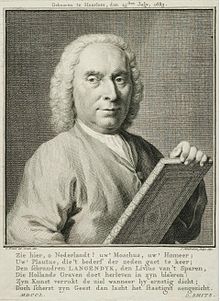Pieter Langendijk
Pieter Langendijk (born July 25, 1683 in Haarlem ; † July 9 or 18, 1756 there ) was a Dutch poet .
Life
Pieter Langendijk was the son of the building contractor Arent Pieterszoon van Langedyck and Anneke Luykes Nieuwenhuysen. After losing his father at the age of six, his mother sent him to Amsterdam four years later , where he learned Latin from the linguist William Sewell. Around 1695 he moved to The Hague and worked there as a damask weaver and pattern maker. He joined artistic circles and began writing poetry. In 1722 he settled with his mother in his hometown, for whom he wrote poetry annually from 1724 to 1744. In September 1727, shortly after his mother's death that same year, he married Joannetta Sennepart, who died in 1739. Due to considerable impoverishment, he had to sell numerous books and paintings in 1747. His appointment as historiographer Haarlem (1749) secured his livelihood, but his town history remained unpublished. He died in Haarlem in 1756 at the age of almost 73 after being baptized five days earlier by Jan Visser, a preacher in the Mennonite congregation.
Works
Among the best literary works of Langendijk, who was influenced by French playwrights, especially Molière , are his early comedies, such as his comedy Don Quichot op de bruiloft van Kamacho (= Don Quixote at the wedding of Kamacho ), which he wrote in 1699 at the age of 16 He borrowed material from the novel Don Quixote by Miguel de Cervantes . It was later edited and performed in 1711. Langendijk's comedies are mostly written in a light, natural tone and have long been part of the stage repertoire. His other comedies include:
- De Zwetser , Amsterdam 1712
- Het niezijdsch huwelijks bedrog , Amsterdam 1712
- Krelis Louwen of Alexander de Groote op het poëtenmaal , Amsterdam 1715
- De wiskunstenaars of't Gevlugte juffertje , Amsterdam 1715
- Quincampoix of de windhandelaars , Amsterdam 1720
- Arlequyn Actionist , Amsterdam 1720
- De bedriegerij van Cartouche of de Fransche roovers , Amsterdam 1732
- Xantippe of het booze wijf des filozoofs Socrates beteugeld , Amsterdam 1756
- De mirror of the Vaderlandsche Kooplieden , 1760; unfinished
Langendijk also wrote a travesty of the fourth book of the Aeneid of Virgil in the Art of Scarrons ( De Eneas van Vergilius in zijn zondagspak , Amsterdam 1715) and the tragedy Julius Cezar en Kato (Amsterdam 1720).
Following the poetic direction of the time, Langendijk also composed many shepherd, fisherman and field songs, described the beautiful surroundings of Kleve in Reimversen ( De stad Kleef, haar gezondheidsbron, en omleggende landsdouwen, in kunstprenten verbeeld , Haarlem 1747) and wrote one Rhymed biography of William I of Orange ( Willem de Eerste, Prins van Oranje , Haarlem 1754; 2nd edition 1762) and a rhymed story of the Counts of Holland ( De Graaven van Holland, in jaardichten beschreven , Haarlem 1745). As a historian of Haarlem, he made some valuable comments on Samuel Ampzings Beschrijvinge ende lof der stad Haerlem in Holland: in Rym bearbeyd (1628), which were published by Gerrit Willem van Oosten de Bruyn in his Stad Haarlem en hair divorced (Haarlem 1765).
A complete edition of Langendijk's works appeared in nine volumes on Haarlem in 1760, his comedies and poems, including many ridiculous poems ( hekeldichten ), along with a short biography, were published in a special edition in four parts (Haarlem 1721-60).
literature
- Karl Theodor Wenzelburger: Langendijk (Pieter) . In: Johann Samuelersch , Johann Gottfried Gruber (Hrsg.): Allgemeine Encyclopädie der Wissenschaften und Künste , 2nd section, 42nd part (1888), p. 45f.
- Langendijk, Pieter . In: Gero von Wilpert (Htsg.): Lexikon der Weltliteratur , 3rd edition, 1988, ISBN 3-520-80703-3 , p. 864.
| personal data | |
|---|---|
| SURNAME | Langendijk, Pieter |
| BRIEF DESCRIPTION | Dutch poet and playwright |
| DATE OF BIRTH | July 25, 1683 |
| PLACE OF BIRTH | Haarlem |
| DATE OF DEATH | July 9, 1756 or July 18, 1756 |
| Place of death | Haarlem |

